On February 25th during Chicago OpenGov Hack Night, Cathy Deng talked about Expunge.io, a guide to help youth in Cook County erase their juvenile arrest and/or court records through the legal process of juvenile expungement.
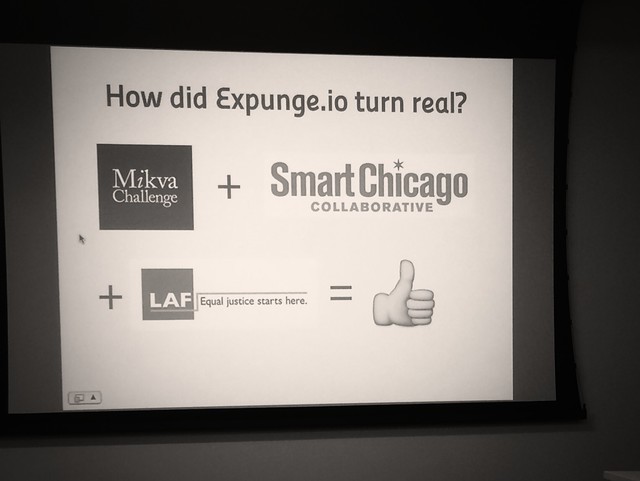
On February 25th during Chicago OpenGov Hack Night, Cathy Deng talked about Expunge.io, a guide to help youth in Cook County erase their juvenile arrest and/or court records through the legal process of juvenile expungement.

 Today the Knight Foundation announced an award to Smart Chicago, through their longtime partner and our founder & fiscal agent, The Chicago Community Trust, to “continue to design, build and demonstrate the power of digital tools to the community and empower residents to use news and information to improve their quality of life.”
Today the Knight Foundation announced an award to Smart Chicago, through their longtime partner and our founder & fiscal agent, The Chicago Community Trust, to “continue to design, build and demonstrate the power of digital tools to the community and empower residents to use news and information to improve their quality of life.”
This grant builds off of previous work among The Trust, Knight, and Smart Chicago— the Kick-Starting Civic Innovation grant, which we have used to fund the CivicWorks project.
The Trust and the Knight Foundation have a long relationship in the Community Information Challenge, including the Community Media Matters program funded by both parties.
 Today the Knight Foundation awarded a Prototype Fund award to Joe Olson, one of the developers of Foodborne Chicago, to “develop strategies to engage with targeted communities currently being missed through Chicago’s Twitter-based food poisoning incident detection system.”
Today the Knight Foundation awarded a Prototype Fund award to Joe Olson, one of the developers of Foodborne Chicago, to “develop strategies to engage with targeted communities currently being missed through Chicago’s Twitter-based food poisoning incident detection system.”
Smart Chicago, through our fiscal agent, The Chicago Community Trust, is going to administer this grant. We are also helping out by using our CUTGroup program.
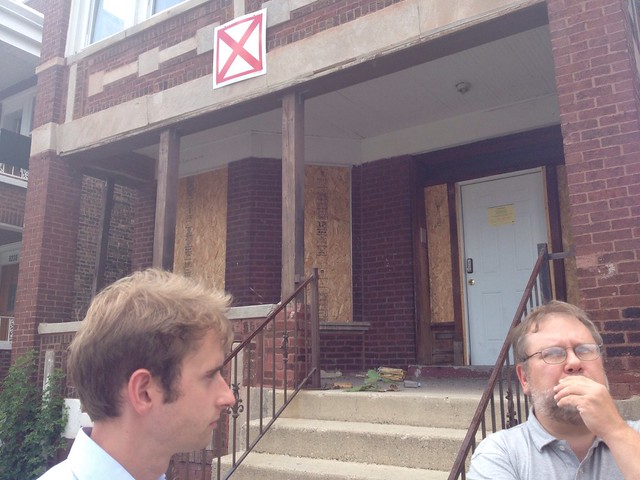
Matt Hampel from LocalData and David McDowell from the Southwest Organizing Project talk about vacant building data.
Smart Chicago Collaborative is proud to announce our partnership with the Southwest Organizing Project and LocalData as part of the Civic Works Project — providing tools that empower organizations to make change in their neighborhoods.
 Next week, Smart Chicago will be at the Code for America Summit in San Francisco. We’re big fans and supporters of Code for America and we’re excited to take part in the summit. Dan O’Neil is one of the featured speakers at the event and Christopher Whitaker will be assisting with the Code for America Brigade training day. Continue reading
Next week, Smart Chicago will be at the Code for America Summit in San Francisco. We’re big fans and supporters of Code for America and we’re excited to take part in the summit. Dan O’Neil is one of the featured speakers at the event and Christopher Whitaker will be assisting with the Code for America Brigade training day. Continue reading

On Saturday, civic web developers, designers, and data gurus came together with the Chicago Police Department at Google’s Chicago headquarters to test out and find creative ways to use the new ClearPath API.
ClearPath is the Chicago Police Department’s community information portal. First launched in 2007, ClearPath gives residents information not only about crime in their area, but also information about which police beat they’re on and when their CAPS meeting is.
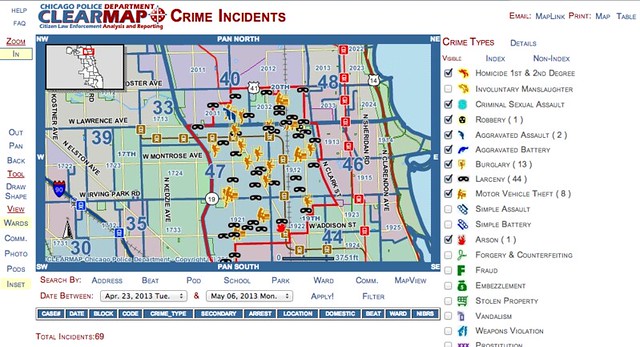
CAPS (Chicago Alternative Policing Program) is Chicago’s community policing program. At the center of this program are the CAPS meetings that occur in each police beat. At the CAPS meetings, the police department can hear about community concerns in the neighborhood and interact with local residents.
With the new API, the Chicago Police Department wants to make it easier for residents to interact with the ClearPath website and to report community concerns. CAPS Executive Director Lucy Moy and CPD Information Services Direction Jonathan Lewin explain:

Photo Courtesy of Brian Fitzpatrick
The hackathon produced a number of creative ways to use the API to make it easier to interact with CAPS and the ClearPath system.
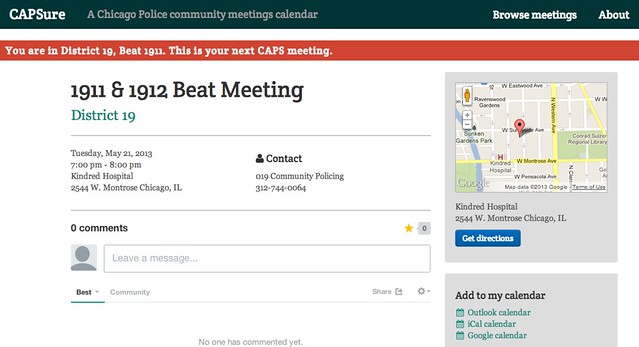
Derek Eder and the OpenCityteam helped to test the API and got an early start on building an app using the API.
The app they launched is called CAPsure. CAPSure helps residents get information about their local CAPS meeting. You enter in your address and the app will tell you which police beat you are in, when your next CAPS meeting is, and where the meeting is located. The app can also add the meeting to your Outlook, Google, or iCal calendars.
The app uses the ClearPath API’s calendar and event data to find events. The app also uses the City of Chicago’s data sets to help find users police district and beat number.
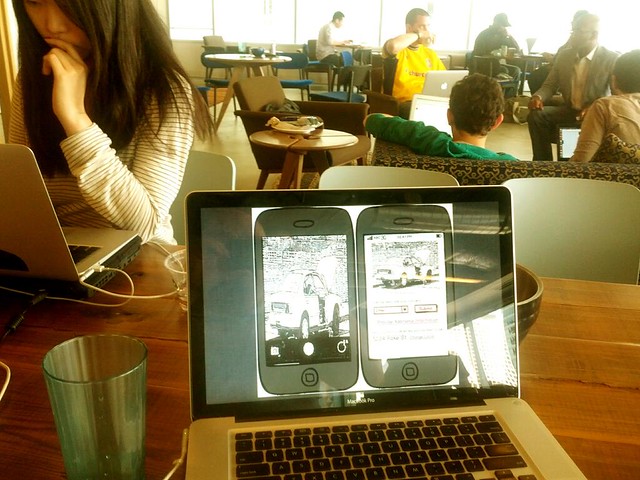
Image courtesy of Patrick Brown
The winner of the Hackathon was a team of Patrick Brown, Karl Statz, Donchaa Carroll, and Cathy Deng.
For this concept, the app attaches a picture to community concerns submitted by residents. Currently, the ClearPath API doesn’t allow you to include pictures when making a community concern report. This mobile app allows users to send their local CAPS district a picture of a concern such as an abandoned building or graffiti to help aid in the investigation.
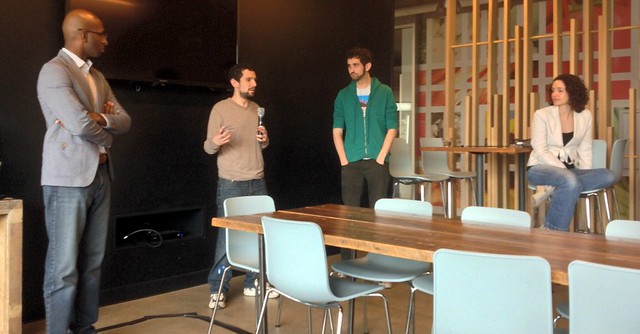
The runner-up for the hackathon was the team of Alex Soble, Josh Kalov and Demond Drummer.
Their app prototype allows users to send a community concern to their local CAPS district by text so that residents without the internet could still take advantage of the new system.
In third place was an app prototype built by Kevin McMahon. This mobile app not only uses the ClearPath API to help report community concerns, but it will also alert users when crime is reported near them.
Other ideas for using the ClearPath API included:
MapThatTrap: An app that residents can use to report abandoned buildings to both 311 and to the ClearPath API
Green Light Program: A concept that would change the colors of Chicago’s Blue Light Cameras from blue to green as crime rates went down in the neighborhood.

For groups wanting to continue to work on their apps or for people not at the hackathon wanting to get involved, there are some great resources out there to make that happen.
The first is the Chicago OpenGov Hacknight that happens every Tuesday at 6:00pm at 1871. The OpenGov Hack Nights are a great place to learn about what is happening with civic innovation in Chicago and work on civic app projects.
If you’re looking for a place to host your civic app, the Smart Chicago Collaborative provides free hosting to civic applications. Smart Chicago will also provide user testing for your app for free as well.
If civic developers have questions about the API, they can contact the developers directly by emailing [email protected]
Making our communities safer is an ongoing challenge that will not be solved in a single weekend or by a single web application. To utilize the new API to the fullest extent will require partnerships between the CAPS office, civic technologists, and community groups. If you’re a CAPS group or neighborhood organization that would like to form partnerships with civic technologists, feel free to email cwhitaker @ cct.org for more information.
A big thank you goes out to the Google’s Brian Fitzpatrick for hosting the hackathon, as well as the Chicago Mayor’s Office and Department of Innovation and Technology for putting on the event. A special thanks also goes out to the Chicago Police Department for spending their Saturday with us and their continued service to the City of Chicago.